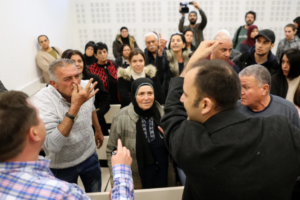Palestinian deaths, and other points Haaretz failed to mention

Members of Bakri’s family confront IDF reservists in court.
1. Over 1,000 Israelis killed. Doron Koren, in his article about the legal battle of reservists and their families against actor Mohammad Bakri and his film “Jenin, Jenin” (Galleria, Haaretz Hebrew edition, August 5), writes that over 1,000 Israelis were killed during the second Palestinian uprising (around 70 percent civilians). He didn’t see fit to mention that over 3,100 Palestinians were killed up to January 2005 by the Israel Defense Forces and Border Police. The omission of this statistic is part of the natural contempt for Palestinian life on the part of Israelis. The omission says: It’s natural for Palestinians to be killed. It’s not natural for Israelis to be killed.
How many of the dead were civilian, unarmed Palestinians? B’Tselem, more than any other organization, does its all to document the circumstances of the killing of each person, and to note whether the slain person “participated in combat” or did not participate. When it is uncertain, B’Tselem only gives the basic facts. It is estimated that about half of those killed between the end of 2000 and the beginning of 2005 were unarmed civilians.
Let us remember that during the first two days of the intifada – September 29 and 30, 2000 – 16 Palestinians were killed in the Gaza Strip and the West Bank. At least 10 of them “didn’t participate in combat,” in other words, ordinary civilians. During those two days one Israeli soldier was killed, and not a single Israeli civilian. We will also mention the 12 Palestinian citizens of Israel, who participated in the demonstrations of solidarity with their people during the first week of October – and who were shot dead by Israeli policemen. And another Jewish civilian who was killed by a rock thrown as he was driving past Jisr al-Zarqa.
These statistics played an important role in the increased arming by Palestinian organizations and the choice of the tactic of suicide attacks.
For the sake of accuracy, the history of the Jenin refugee camp does not begin with the first person who was killed or the first who killed. It actually begins with the fact that the origins of the Abu al Hija family are in Ein Hod and those of the Zubeidi family, in Caesarea – two Palestinian villages turned into fancy Jewish communities.
2. Prof. Dina Porat. We know her from her frequent comments regarding the panicky statistics of world antisemitism. But in Doron Koren’s article she is mentioned as the chief historian of the Yad Vashem Holocaust History Museum. Israel Caspi, one of those suing Bakri, asked for her opinion of the film. He said that she wrote to him that Hitler said things similar to a statement about Jews by one of the interviewees in the film.
For the sake of accuracy, I will say that I never asked Porat for her opinion of statements by right-wing MK Bezalel Smotrich; neither did I ask her opinion about the torching of mosques and the racist graffiti in Hebrew, about the killing of entire non-Jewish families in deliberate Israeli bombings. I never asked Porat for her opinion of Jews who attack non-Jewish olive pickers until they bleed. I know that expressing a position on the issue of harm caused by Jews to non-Jewish Semites exceeds her mandate.
3. Judges are tainted by a conflict of interest. That is an axiom that hovers over the ostentatiously political chatter in Israel, and reflects another right-wing success – by putting the judges in the dock. They are unjustly suspected of leftist tendencies, but the suspicion is enveloped in professional terms and ostensibly incriminating details, such as articles by journalist Kalman Liebeskind about Supreme Court President Esther Hayut.
On Friday Hayut published criteria for judicial disqualification. For the first time, publication was initiated by the court and is not part of an answer to a question based on the Freedom of Information Law. Although Smotrich’s draft bill to establish a commission of inquiry to examine conflict of interests of judges failed, we can conclude that the combination of selective criticism by journalists from the right on the one hand, and focused and venomous right-wing propaganda on the other, is doing the job. The pressure is working.
In the past judges were placed above any criticism and suspicion. In the 1980s, left-wing activist Gideon Spiro was the one to pave the way for bringing judges down to the level of ordinary mortals, when he asserted that in their rulings against Palestinians they are influenced by the public atmosphere. He was prosecuted and forbidden to send letters of criticism to the judges. A legal battle waged by the Association for Civil Rights in Israel finally lifted the prohibition.
Presumably, right-wing criticism of the judges is going in the same direction and stems from the understanding that every judge is a product of his or her social and economic status, ethnic origin and social milieu. The criticism is designed to create a public atmosphere that would put every justice in his or her place. For the sake of accuracy, we will stress that every Israeli judge – settler or not, religious or secular, in a military court or a civil one, native-born Israeli or immigrant – is tainted by a profound conflict of interest when he judges a Palestinian who actively opposes the hostile, dispossessing Israeli military regime, who demonstrates against his eviction from his land by Jews, who builds without a permit because only Jews can get a permit. The difference is that the Israeli Jewish public, headed by the right-wing knights, doesn’t find any conflict of interest there.
This article is published in its entirety.
